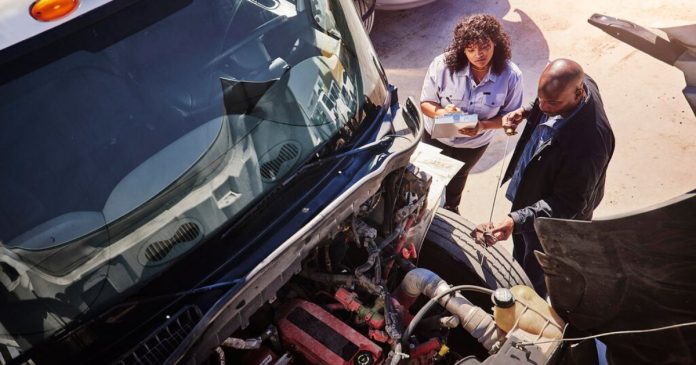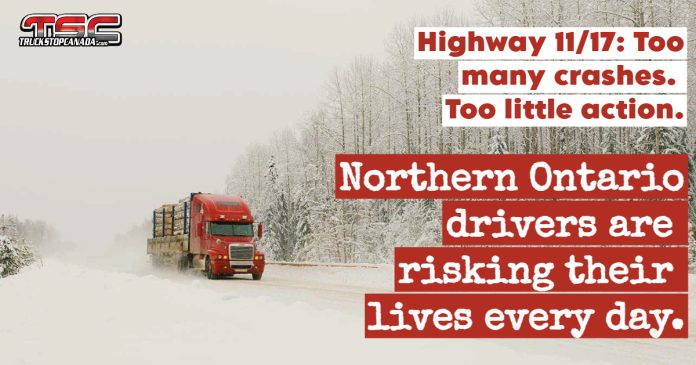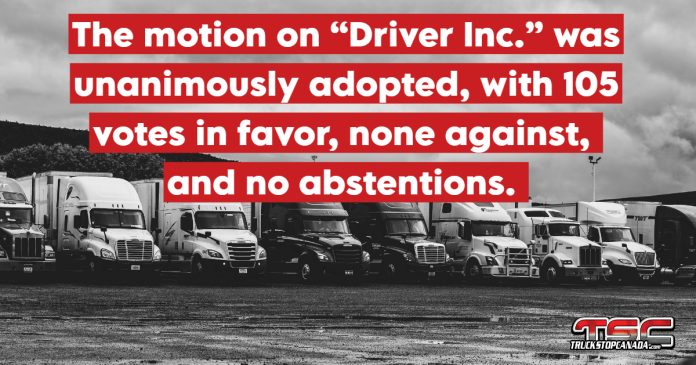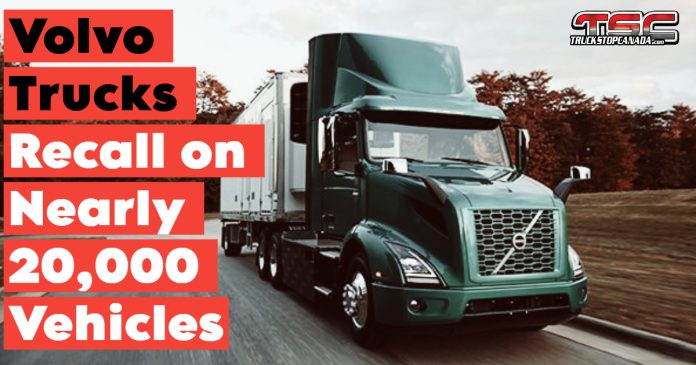Highway 11-17, a vital corridor in Northern Ontario, has become synonymous with danger for truck drivers and other road users. Despite repeated warnings and calls for action, the government seems slow to take responsibility for improving road safety.
The consequences are tragic: fatal crashes, stressed-out drivers, and growing frustration from mayors, elected officials, and citizens as the situation keeps getting worse.
Poor Training, Serious Risks
One of the main causes of accidents on these highways is the inadequate training of new truck drivers. A shocking CBC Marketplace investigation revealed major flaws in some truck driving schools in Ontario. Undercover footage showed how certain schools bypass the requirements of the MELT (Mandatory Entry-Level Training) program, “selling” training hours on paper, skipping real instruction, and conducting rushed road tests far below standard. Unqualified instructors, students unable to perform basic maneuvers, and licenses issued despite repeated failures are just some of the issues uncovered.
These dangerous practices allow undertrained drivers to operate heavy vehicles, putting not only themselves but everyone on the road at risk.
A Flawed MELT Program
The MELT program, designed to provide 103.5 hours of training, has faced strong criticism from within the industry. Experienced drivers call it a joke, criticizing both its weak theoretical content and the lack of enforcement. Ironically, the program was introduced after the tragic 2018 Humboldt Broncos crash, caused by an unqualified truck driver.
« There are no standards. The MELT program is a joke. I could easily find at least 10 companies willing to push you through without it », said Jesse Hoch, a trucker from Ontario.
And it’s not just truckers raising red flags. Julie Miller, a former instructor/evaluator for the fire service from Manitouwadge in Northwestern Ontario, says the system is out of control:
« Traveling on 11/17 has become a game of Russian roulette. The sad part is, there is no room for games on these highways. Every time we have to leave our homes, it involves travel on 11/17. The things we have witnessed show both the lack of training and the total lack of respect for human lives. The number of things we have witnessed should have never happened. »
According to the Ontario Provincial Police (OPP), 60% of all fatal crashes in Northwestern Ontario in 2024 involved transport trucks. Of the 21 recorded fatalities, 13 involved heavy vehicles—a 30% increase over the five-year average. Province-wide, about 20% of fatal collisions involved a transport truck. In Julie Miller’s region, the proportion is three times higher than the provincial average.
Unequal Access to Training
While some schools receive government subsidies to offer low-cost training to newcomers, local workers often have to pay thousands of dollars out of pocket to access training that ultimately leads to the same result: obtaining a commercial driver’s license. This situation creates a deep sense of injustice, as the rules clearly do not apply equally to everyone.
A newcomer may receive subsidized training, while a candidate like Jesse, who grew up here and is fully familiar with the realities of our Canadian winters, has to pay from his own pocket to enter the industry. Meanwhile, some drivers have never even driven in such conditions before getting their license.
« Between 2016 and 2018, I wanted the government to help me transition out of roofing—partly because I was laid off, but also to get into trucker training. Instead, they put me through three years of hell, constantly denying me, saying I didn’t qualify. In the end, I had to pay $3,000 out of pocket for my DZ license, work terrible jobs for three years, and then spend $5,800 at the highest-accredited school in Windsor. We even had the Instructor of the Year for all of Ontario, so I thought it was prestigious. But then I see what it actually takes to qualify now, and it’s disgusting », Jesse Hoch shared.
Poor Testing and Favoritism
Truck drivers also report questionable practices in certain regions, particularly in Brampton and Surrey. Personal or community ties between applicants and examiners may influence test results, some truckers say. Some schools even offer multiple free retakes, with the extra attempts subsidized by the government, allowing underqualified drivers to pass the exam without real consequences, even after several failures.
The system, therefore, seems to prioritize the quantity of graduates over quality, directly compromising road safety.
Lack of Oversight in a Deregulated Industry
In the North, residents are noticing that roadside inspections are rare and that many weigh stations are closed, limiting authorities’ ability to verify whether drivers and vehicles comply with safety standards. As a result, unqualified drivers, misclassified workers, and poorly maintained vehicles are circulating freely, increasing the risk of accidents.
But the problem goes even further. The government is slow to enforce its own laws and is allowing a chaotic system to deteriorate. Some companies hire inexperienced drivers, put them behind the wheel of faulty equipment, and exploit them, particularly through the “Driver Inc.” scheme. Worse still, some operate without the proper license class, without valid documents, or even without insurance.
This negligence allows unscrupulous carriers to cut costs by avoiding payroll taxes, neglecting training, and skipping proper fleet maintenance. By cutting corners everywhere, they offer rock-bottom rates that crush honest, law-abiding companies. The result: unfair competition, threatened jobs, more dangerous roads, and a government that keeps turning a blind eye instead of taking meaningful, deterrent action.
Poorly Trained Drivers Left on Their Own
Newcomers often receive a license without adequate training, then are thrown straight into real-world operations; underpaid, poorly supervised, and overwhelmed.
« It’s outrageous! These workers don’t know what they’re getting into. Companies bring them to Canada, selling them dreams of a good job and life here. But the reality is far from it. These drivers are thrown into the system with zero training—they can’t even back up a truck! » said Johanne Baril, Mayor of Val Rita-Harty, in an interview on TSQ.
Clear Solutions, Still Ignored
Why not require a new road test for all drivers? Why not remove the ability for private schools to issue licenses?
« What I really don’t understand is why no action has been taken yet. There are some immediate changes they can make, but are choosing not to », says Julie Miller. « They can start holding these bogus training schools accountable. Rescind driver permits issued by programs that have been shown to not include the required classroom and practical training. Start requiring retesting for all new drivers who have been involved in ANY incident/accident. Rescind these private training companies’ ability to issue their own licenses. There are more immediate actions that can be taken, which include more police/MTO presence, inspections, and enforcement. Why are scales closed more than they are open? »
She also questioned whether drivers should at least demonstrate basic English proficiency to understand road signs, and have some driving experience in Canada before being licensed. Is the labour shortage really bad enough to accept such major safety compromises?
Meanwhile, there’s little effort to promote trucking careers among local youth. Shouldn’t we attract qualified candidates instead of lowering standards?
(Video by Richard Deschamps, published on Hwy 11/17 kills people – La Route 11/17 tue des gens.)
This is not about blaming immigrants—it’s about public safety. Handing the keys to a heavy truck to someone who isn’t ready is a risk for everyone, regardless of their background.
Outdated Infrastructure
Beyond the training issue, Highways 11 and 17 suffer from aging infrastructure that is poorly suited for heavy truck traffic. A survey of truck drivers shows that the lack of safe passing zones is among the most frequently reported problems.
(Video published on Hwy 11/17 kills people – La Route 11/17 tue des gens.)
Weather conditions present a constant challenge: Highways 11 and 17 are often snow-covered or icy, but safety measures fail to keep up. Better winter maintenance and investments in infrastructure modernization could prevent many accidents.
« If the roads close, there’s no detour » said MPP Guy Bourgouin on TSQ. « This is the Trans-Canada Highway. I often tell people that this is not some backroad; it’s the Trans-Canada, and we need services that reflect that reality. »
With every election, promises for improvement multiply. But will we ever see real change? And more importantly, how long will it take? Political speeches are plenty, but on the ground, the highway remains just as dangerous.
A National Trade Route Stuck in the Past
Despite its strategic importance, Highway 11/17 remains, in many areas, a simple two-lane road; one lane in each direction. It’s a paradox in a country that claims to promote interprovincial trade. How can we talk about economic growth, efficient transportation, and fast deliveries when this vital corridor, in the heart of the country, fails to keep pace with market demands and growing freight needs?
While trade continues to expand, infrastructure remains stuck in the past.
For residents of Northern Ontario, Highway 11/17 is far more than just a stretch of the Trans-Canada Highway, it’s a lifeline. Every closure due to an accident disrupts daily life and can even endanger lives, especially for those needing urgent access to medical services. And it keeps happening again and again.
« People need to understand that for us, these are major arteries. If we want to get to medical appointments, send our kids to school, or get to work, we rely on Highway 11/17—there are no alternatives! » added M. Bourgouin.
Truckers Are Afraid
Faced with increasingly precarious conditions, many experienced truck drivers admit they are afraid to hit this road. Some of them have spent years driving in Northern Ontario, but today, they prefer to work for companies that offer other routes or simply leave the industry altogether.
(Video published on Hwy 11/17 kills people – La Route 11/17 tue des gens.)
« The problem with two-lane highways in Northern Ontario and the Canadian Rockies is that, even if you’re the best driver in the world and received proper training, you’re still at the mercy of the truck coming toward you. Was that driver properly trained? Did they get their license through questionable means? Will they lose control just before passing me and crash into my lane? » explains Patrick Leblanc, a trucker from Quebec who drives as a team with his partner.
« So many people have died in head-on collisions on Highway 11/17, it’s incredibly tragic. No, I’ve seen too many deaths and too much blood throughout the years I’ve spent driving those roads. I value life, and I love my sweetheart Nathalie too much to keep putting our lives at risk on these roads, knowing everything I know. And that’s coming from a truck driver with 27 years of experience. »
Urgent and Essential Reforms
Faced with this alarming situation, several groups from the trucking industry have called on the government to implement concrete reforms; not only regarding driver training, but also safety, compliance, and infrastructure. They are demanding stricter oversight of driving schools, more roadside inspections, and concrete measures to put an end to fraud, misclassification errors, and to modernize the road network.
Trucking associations across the country are also urging the government to take action against the “Driver Inc.” model. In Quebec, the pressure is mounting, and carriers are fed up with this harmful system that undermines their operations, road safety, and the quality of jobs. The phenomenon, rooted in Brampton and surrounding regions, has become deeply entrenched and continues to spread, even into the province of Quebec.
A Call to Action
Without immediate commitment from authorities, the situation will continue to deteriorate, endangering everyone who uses these roads every day. And when ministers refuse to acknowledge the reality, it’s easy to understand the deep discouragement of citizens in Northern Ontario.
Ontario’s Minister of Transportation recently claimed that the province’s roads are among the safest. That statement was poorly received, especially by those who have lost loved ones on Highway 11-17, where fatal crashes keep rising. When will a government official actually come and drive these roads in the middle of winter to truly understand what people are facing?
While ministers work on polishing their public image, skilled truck drivers are leaving the profession, the system spins in circles, the situation worsens… and families are burying their children. What we need today is not more promises, but bold, decisive action. Before more crosses appear on the side of the road.
More :
This week on JE: a deep dive into what’s happening with some trucking companies in Brampton. Driver Inc., safety issues, training gaps, abuse… A MUST-WATCH: Friday at 8 p.m. on TVA. (Please note: this investigative report is broadcast in French only.)
Come see what’s happening on Highway 11-17: Highway 11-17 kills people.




























